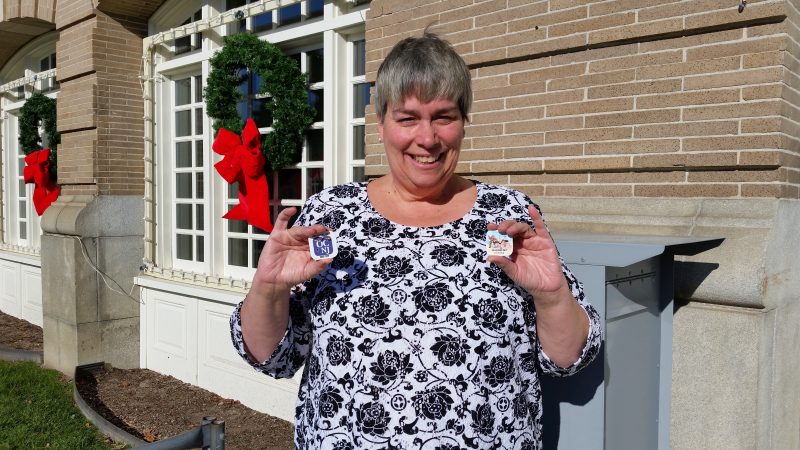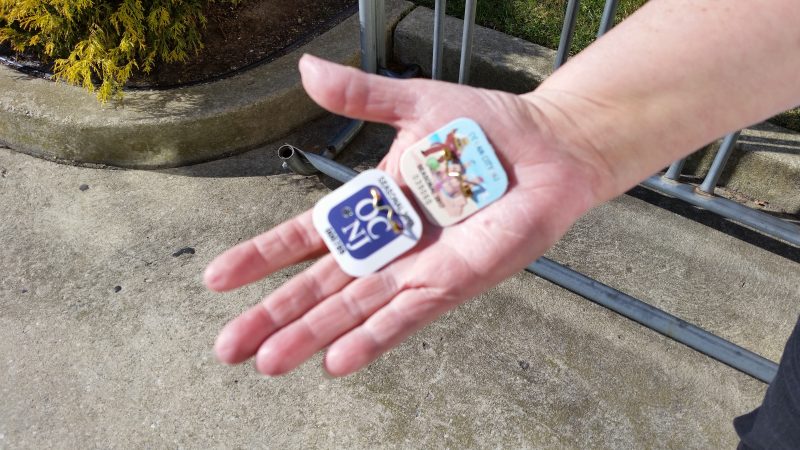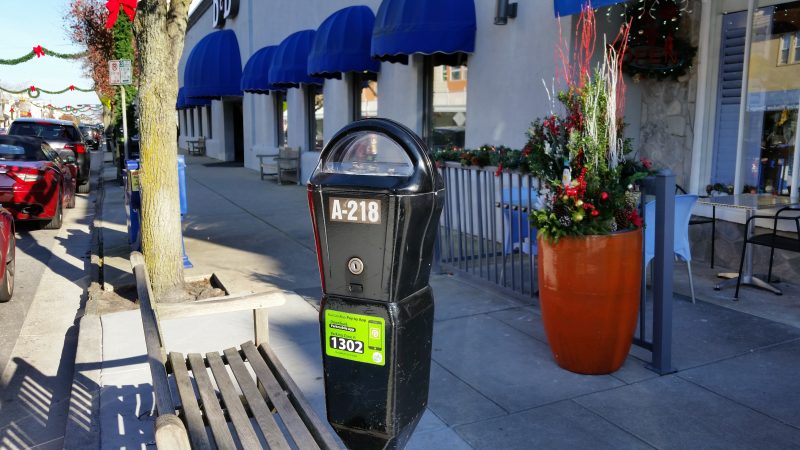Similar to beach tag sales, parking revenue is an indicator of the strength of the summer tourism season.
 By Donald Wittkowski
Ocean City’s 2017 beach tag sales were solid, if not spectacular, during an occasionally rainy summer that may have put a damper on the day-tripper market.
In all, the city reaped $4 million in revenue from beach tags this past summer, compared to $4.1 million in 2016, according to figures released Monday. Ocean City had an all-time high of nearly $4.2 million in beach tag revenue in 2015.
“It was a solid season, but definitely not the pinnacle,” Frank Donato, the city’s chief financial officer, said of the 2017 summer. “That seems to be consistent with some other segments of the tourism industry.”
Donato noted that shop owners in Ocean City’s downtown business district and on the Boardwalk told him they generally had a “very good” summer season.
Beach tag sales are a key indicator of the strength of summer tourism. Sunny weather is a huge factor in helping to draw throngs of sunbathers. Conversely, rainy days or even the threat of inclement weather can scare away visitors, which appears to have happened in Ocean City this year.
Altogether, 375,707 beach tags were sold in 2017, down 5.5 percent compared to 397,861 in 2016, figures show. About 6,000 beach tags were given out for free in both 2017 and 2016 to veterans or active members of the military and their families as part of a special city program that recognizes the armed services.
By Donald Wittkowski
Ocean City’s 2017 beach tag sales were solid, if not spectacular, during an occasionally rainy summer that may have put a damper on the day-tripper market.
In all, the city reaped $4 million in revenue from beach tags this past summer, compared to $4.1 million in 2016, according to figures released Monday. Ocean City had an all-time high of nearly $4.2 million in beach tag revenue in 2015.
“It was a solid season, but definitely not the pinnacle,” Frank Donato, the city’s chief financial officer, said of the 2017 summer. “That seems to be consistent with some other segments of the tourism industry.”
Donato noted that shop owners in Ocean City’s downtown business district and on the Boardwalk told him they generally had a “very good” summer season.
Beach tag sales are a key indicator of the strength of summer tourism. Sunny weather is a huge factor in helping to draw throngs of sunbathers. Conversely, rainy days or even the threat of inclement weather can scare away visitors, which appears to have happened in Ocean City this year.
Altogether, 375,707 beach tags were sold in 2017, down 5.5 percent compared to 397,861 in 2016, figures show. About 6,000 beach tags were given out for free in both 2017 and 2016 to veterans or active members of the military and their families as part of a special city program that recognizes the armed services.
 Altogether, 375,707 beach tags were sold in 2017, down 5.5 percent compared to 397,861 in 2016, figures show.
The number of preseason, seasonal and weekly beach tags sold in 2017 was comparable to last year’s figures.
Daily beach tag sales, though, were down significantly this summer compared to the 2016 level, a decline Donato largely blamed on rainy weather that may have discouraged visitors from making day trips to the shore.
“We definitely had more rain in July and August than we normally have,” he said. “We also ran into a little more pop-up showers and rain on the weekends.”
Overall, 189,249 daily beach tags were sold this past summer, a 10.5 percent decline compared to 211,501 in 2016.
Even with the decline in sales this year, Donato pointed out that Ocean City still annually leads all Jersey Shore towns in the amount of beach tag revenue.
The city’s 7-mile-long beachfront is much bigger than neighboring towns, allowing it to handle enormous crowds. At the peak of the summer vacation season, the number of visitors can swell to about 150,000, compared to Ocean City’s year-round population of 11,700, Donato said.
“We’re No. 1 in the state in terms of beach tag revenue,” he said. “One of the reasons is that we’re one of the biggest municipalities in land mass. Just the sheer size of Ocean City is one of the reasons we’re No. 1.”
Altogether, 375,707 beach tags were sold in 2017, down 5.5 percent compared to 397,861 in 2016, figures show.
The number of preseason, seasonal and weekly beach tags sold in 2017 was comparable to last year’s figures.
Daily beach tag sales, though, were down significantly this summer compared to the 2016 level, a decline Donato largely blamed on rainy weather that may have discouraged visitors from making day trips to the shore.
“We definitely had more rain in July and August than we normally have,” he said. “We also ran into a little more pop-up showers and rain on the weekends.”
Overall, 189,249 daily beach tags were sold this past summer, a 10.5 percent decline compared to 211,501 in 2016.
Even with the decline in sales this year, Donato pointed out that Ocean City still annually leads all Jersey Shore towns in the amount of beach tag revenue.
The city’s 7-mile-long beachfront is much bigger than neighboring towns, allowing it to handle enormous crowds. At the peak of the summer vacation season, the number of visitors can swell to about 150,000, compared to Ocean City’s year-round population of 11,700, Donato said.
“We’re No. 1 in the state in terms of beach tag revenue,” he said. “One of the reasons is that we’re one of the biggest municipalities in land mass. Just the sheer size of Ocean City is one of the reasons we’re No. 1.”
 Frank Donato, chief financial officer, says Ocean City leads all Jersey Shore towns in the amount of annual beach tag revenue.
Beach tag revenue covers the cost of keeping the beaches clean, employing lifeguards, hiring summer police officers and paying for the city’s share of beach replenishment projects in partnership with the U.S. Army Corps of Engineers, Donato said.
Another barometer of the strength of the summer tourism season is parking revenue. Similar to beach tag sales, parking revenue declined in 2017.
“It was weather-related as well,” Donato said of the lower parking income. “Parking was down all summer long, in June, July and August.”
Overall, the city had slightly more than $3 million in parking revenue in 2017, compared to $3.162 million in 2016, Donato said. The 2016 figure was a record high.
Revenue from parking meters in 2017 was comparable to the 2016 figure. However, the city’s eight parking lots experienced a drop-off in revenue.
Donato said the lots parked about 900 fewer cars in 2017 compared to 2016. As a result, parking lot revenue fell from slightly more than $2 million in 2016 to about $1.9 million this year.
Frank Donato, chief financial officer, says Ocean City leads all Jersey Shore towns in the amount of annual beach tag revenue.
Beach tag revenue covers the cost of keeping the beaches clean, employing lifeguards, hiring summer police officers and paying for the city’s share of beach replenishment projects in partnership with the U.S. Army Corps of Engineers, Donato said.
Another barometer of the strength of the summer tourism season is parking revenue. Similar to beach tag sales, parking revenue declined in 2017.
“It was weather-related as well,” Donato said of the lower parking income. “Parking was down all summer long, in June, July and August.”
Overall, the city had slightly more than $3 million in parking revenue in 2017, compared to $3.162 million in 2016, Donato said. The 2016 figure was a record high.
Revenue from parking meters in 2017 was comparable to the 2016 figure. However, the city’s eight parking lots experienced a drop-off in revenue.
Donato said the lots parked about 900 fewer cars in 2017 compared to 2016. As a result, parking lot revenue fell from slightly more than $2 million in 2016 to about $1.9 million this year.
 Similar to beach tag sales, parking revenue is an indicator of the strength of the summer tourism season.
This summer was the second year that people were given the option of using a mobile app to pay for their parking at the meters or lots.
The city says the app has simplified parking because people no longer have to worry about scrambling for loose change or running back to plug the meter when it expires.
Donato said the app generated about $43,000 in parking revenue in 2016, but the figure increased to around $65,000 this year, indicating that the mobile payment option is becoming more popular.
Customers first must register either by downloading the app in their phone’s app store (search for "parkmobile") or online at www.parkmobile.com. Once they set up an account, they may use the app, the internet or a toll-free number to pay for parking.
Similar to beach tag sales, parking revenue is an indicator of the strength of the summer tourism season.
This summer was the second year that people were given the option of using a mobile app to pay for their parking at the meters or lots.
The city says the app has simplified parking because people no longer have to worry about scrambling for loose change or running back to plug the meter when it expires.
Donato said the app generated about $43,000 in parking revenue in 2016, but the figure increased to around $65,000 this year, indicating that the mobile payment option is becoming more popular.
Customers first must register either by downloading the app in their phone’s app store (search for "parkmobile") or online at www.parkmobile.com. Once they set up an account, they may use the app, the internet or a toll-free number to pay for parking.